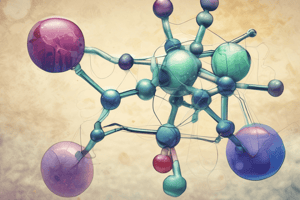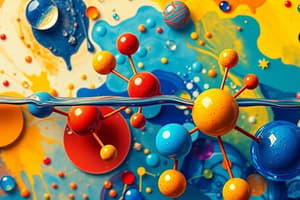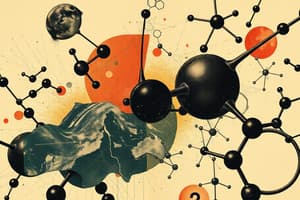Podcast
Questions and Answers
What is the primary function of carbohydrates in the body?
What is the primary function of carbohydrates in the body?
- Provide energy (correct)
- Store energy
- Transport oxygen
- Build muscles
Which element is found in proteins but not in carbohydrates or lipids?
Which element is found in proteins but not in carbohydrates or lipids?
- Oxygen
- Nitrogen (correct)
- Hydrogen
- Carbon
Which of the following is not an example of a carbohydrate?
Which of the following is not an example of a carbohydrate?
- Oils (correct)
- Starch
- Fructose
- Glucose
What is the primary function of lipids in the body?
What is the primary function of lipids in the body?
Which biomolecule contains the elements carbon, hydrogen, oxygen, nitrogen, and phosphorus?
Which biomolecule contains the elements carbon, hydrogen, oxygen, nitrogen, and phosphorus?
What is the primary reason that ice floats in water?
What is the primary reason that ice floats in water?
Which of the following best defines an organic compound?
Which of the following best defines an organic compound?
Which biomolecule is primarily responsible for energy storage in living organisms?
Which biomolecule is primarily responsible for energy storage in living organisms?
What unique property of water allows the basilisk lizard to walk on water?
What unique property of water allows the basilisk lizard to walk on water?
How do cohesion and adhesion differ in the context of water interactions?
How do cohesion and adhesion differ in the context of water interactions?
Flashcards
Cohesion in water
Cohesion in water
The tendency of water molecules to stick to each other.
Adhesion in water
Adhesion in water
The tendency of water molecules to stick to other substances.
Polar molecule
Polar molecule
A molecule with an uneven distribution of electrical charge, resulting in a slightly positive end and a slightly negative end.
Organic compound
Organic compound
Signup and view all the flashcards
Biomolecules
Biomolecules
Signup and view all the flashcards
Carbohydrates
Carbohydrates
Signup and view all the flashcards
Lipids (Fats)
Lipids (Fats)
Signup and view all the flashcards
Proteins
Proteins
Signup and view all the flashcards
Nucleotides
Nucleotides
Signup and view all the flashcards
Biomolecule Structure and Function
Biomolecule Structure and Function
Signup and view all the flashcards
Study Notes
The Chemistry of Living Things
- This presentation covers the chemistry of living organisms, specifically focusing on biochemistry.
- Objectives include relating water's properties to its biological importance, defining organic compounds, distinguishing them from other compounds, comparing carbohydrates, lipids, proteins, and nucleic acids.
Biochemistry Objectives
- Relate the unique properties of water to its vital role in living organisms.
- Define organic compounds.
- Differentiate organic compounds from other types of chemical compounds.
- Compare and contrast carbohydrates, lipids, proteins, and nucleic acids in terms of structure and function.
Essential Question
- Why can humans survive longer without food than without water?
Water Properties
- Water's cohesive and adhesive properties are crucial for life processes.
- Cohesion: Water molecules' attraction to each other.
- Adhesion: Water molecules' attraction to other substances.
- Polarity of water molecules influences its unique properties which are vital to all living things.
- Ice floats because its solid form (ice) is less dense than its liquid form (water).
Organic Compounds
- Organic compounds are covalently bonded compounds, containing the element carbon.
- Examples of organic compounds include carbohydrates, lipids, proteins, and nucleic acids; these are vital biomolecules found in all living things.
Biomolecules
- Many essential components in nutrition labels are biomolecules, the molecules that form living things.
- Carbohydrates, lipids, proteins, and nucleic acids are major biomolecule types.
Carbohydrates
- Elements: Carbon, Hydrogen, Oxygen
- Function: Provide energy
- Examples: Glucose, Fructose, Sucrose, Starch
- Food Sources: Breads, Fruits, Starch, Sugar, Vegetables.
Lipids
- Elements: Carbon, Hydrogen, Oxygen
- Function: Store energy
- Examples: Fats, Oils
- Food Sources: Butter, Nuts, Oil.
Proteins
- Elements: Carbon, Hydrogen, Oxygen, Nitrogen
- Function: Build muscles, hair, blood, skin
- Examples: Enzymes, Hemoglobin
- Food Sources: Beans, Eggs, Meat, Poultry, Seafood.
Nucleotides
- Elements: Carbon, Hydrogen, Oxygen, Nitrogen, Phosphorus
- Function: Contain genetic information
- Examples: DNA, RNA
Further Questions
- What similarities exist between various biomolecules?
- What occurs if the structure or shape of a biomolecule changes?
- What does this reveal about how living organisms are created?
Studying That Suits You
Use AI to generate personalized quizzes and flashcards to suit your learning preferences.




